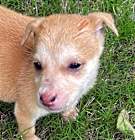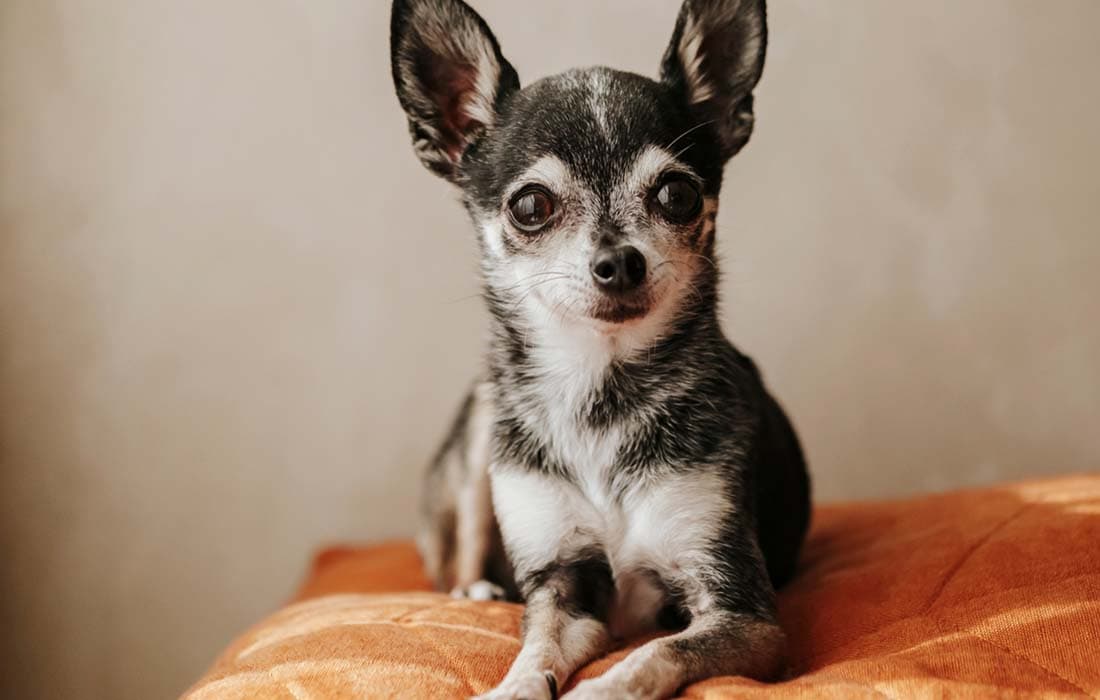Chihuahuas do not get very big; they are extremely small dogs — in fact, they’re the smallest dog breed in the world. Chihuahuas weigh two to nine pounds and reach six to nine inches tall at the shoulder.
Chihuahua
Breed Type: Toy
Common nicknames: Chi
Coat: Smooth
Hypoallergenic: No, they will likely trigger allergies.
Temperament: Confident, lap-dog, clever, territorial
Life expectancy: 14-20 years
Color & patterns:

Originally from Mexico, the small but mighty Chihuahua is like a little package of dynamite. Despite their size (we’re talking teacup level here), these pups are feisty, but they will apply that energy to protect their families; these fiercely loyal pups make the pocket-sized guard dog. Aside from their sassy personalities, Chihuahuas are known for their unique appearance: their apple-shaped heads and bug eyes make them instantly recognizable. So, whether you’re looking for a lap-dog or a fierce protector, the Chihuahua has got you covered.
Chihuahua characteristics
Learn about about Chihuahua basics like their fur colors, shedding levels, how much grooming they need, and other Chihuahua facts.
Average height
6-9 inches (15.2-22.9cm)
Average weight
2-9 pounds (0.9-4.1 kg)
Average lifespan
14-20 years
Exercise needs
Grooming needs
Full-grown size
Good with cats
Good with kids
Training Aptitude
What colors do Chihuahuas come in?
Chihuahuas come in a wide variety of colors; there are more than ten standard Chihuahua colors and patterns. Standard Chihuahua colors include black, black and tan, fawn, fawn and white, blue and tan, cream, chocolate, chocolate and tan, and red.
While the American Kennel Club acknowledges other colors and patterns, such as brindle, sable, and merle, they might not be considered “standard” for the show ring. There is a wide variety of colors and patterns within the breed; nearly 40 colors and pattern combinations might be seen with these pups.
How much do Chihuahuas weigh?
Adult Chihuahuas typically weigh between two to seven pounds. But, just like people, some Chihuahuas might be on the lighter side of the scale, while others might carry a bit more heft. All of them fit comfortably in a lap, though.
How much do Chihuahuas shed?
Chihuahuas are low to moderate shedders who shed less than other toy varieties, but the amount a Chihuahua sheds depends on their coat type. Double-coated, long-haired Chihuahuas may shed more during certain seasons. Because they’re so small, Chihuahuas shed much less than large dog breeds, reducing clean-up efforts and lessening potential allergens.
What does a Chihuahua look like?
Chihuahuas have a rounded head, bright eyes, and radar-like ears. They come in smooth and long-coated varieties, stand six to nine inches tall, and weigh two to seven pounds. They’re small yet energetic, proving that great things come in small packages.
How long do Chihuahuas live?
On average, Chihuahuas live to be 12 to 20 years old. Of course, their lifespan can be influenced by factors like genetics, diet, exercise, and overall care. So, if you’re aiming for the long haul with your Chihuahua, provide them with the right blend of love, proper nutrition, and regular check-ups.
Why were Chihuahuas bred?
Chihuahuas weren’t bred with a singular job in mind like some of their working-class canine counterparts. Instead, they found their place as loyal companions to people. Chihuahuas may be descendants of the Techichi, a small dog that was used in religious ceremonies and as a source of food.
When do Chihuahuas stop growing?
Chihuahuas stop growing around the age of eight months. At that point, they tend to reach their adult height and weight. They might still continue to develop in subtle ways until they’re about a year old.
Are Chihuahuas hypoallergenic?
The Chihuahua is not a hypoallergenic dog breed. Chihuahuas might be small in size, but their impact on allergies can vary from person to person. While no dog is completely hypoallergenic (meaning they won’t trigger any allergies at all), some individuals with allergies might find a Chihuahua more manageable for their allergies due to their small size and short coats.
How many breeds of Chihuahuas are there?
There are two recognized types of Chihuahua: the smooth-coated Chihuahua and the long-coated Chihuahua. Chihuahuas of both types can have coats that are a range of colors and patterns, making each Chihuahua incredibly unique. Common types of Chihuahuas include:
Short-haired Chihuahua
Long-haired Chihuahua
Apple-head Chihuahua
Deer-head Chihuahua
Pear-head Chihuahua
Teacup Chihuahua
Chihuahua health
Learn about about the Chihuahua health outlook and what diseases they may be prone to at various stages of their life.
What fruits are good for Chihuahuas?
There are plenty of fruits that Chihuahuas can eat. But like all treats, these fruits should be supplementary to a complete and balanced dog food diet.
Chihuahuas can eat bananas. Bananas are a fantastic low-calorie snack that is high in potassium. Each banana has only 105 calories and about 200 milligrams of potassium.
Chihuahuas can eat apples. Apples are a safe treat for Chihuahuas, and many of them relish this sweet, crunchy fruit. They are rich in essential vitamins and minerals such as A, C, and K, as well as calcium and phosphorus.
Chihuahuas can eat strawberries. Strawberries are a low-calorie, nutritious treat for Chihuahuas. This sweet fruit is rich in vitamin C and also provides vitamins B1, B6, K, along with potassium, magnesium, iodine, and folic acid.
Chihuahuas can eat watermelon. Watermelon provides Chihuahuas with beneficial vitamins A, B, and C. It also contains significant amounts of potassium and magnesium, two vital minerals.
Chihuahuas can eat blueberries. Rich in vitamin C and fiber, blueberries are touted as one of the healthiest berries for Chihuahuas.
What can Chihuahuas eat?
Chihuahuas can eat a balanced diet of high-quality dog food, including protein sources such as chicken, beef, and fish, along with vegetables and grains. Because of their small size, they do better with smaller pieces of food because they are easier to chew.
Avoid foods toxic to dogs, such as chocolate and onions. Consult your vet for specific dietary recommendations. Chihuahuas cannot eat grapes.
Do Chihuahuas need grooming?
Yes, Chihuahuas need grooming. Grooming isn’t just about maintaining appearances but is a vital aspect of dogs’ overall well-being — brushing, bathing, and teeth cleaning are all part of regular grooming care.
Like other small breeds, Chihuahuas’ small jaws make for weaker teeth, and regular teeth cleaning is essential for Chihuahuas. Their coats don’t need much grooming — even long-haired varieties just need the occasional brushing.
What do Chihuahuas usually die from?
Heart disease is the most common cause of death for aging Chihuahuas, followed by lower respiratory tract disorder and traumatic injury. Regular vet check-ups, dental care, and a healthy lifestyle can help manage these risks and ensure their well-being.
Despite their diminutive size, Chihuahuas are fairly sturdy and subject to relatively few major health problems — certainly fewer than may afflict other dog breeds.
Why do Chihuahuas shake?
Chihuahuas shake because they have a natural tendency to tremble. Chihuahuas are a small breed with a high metabolism, which can lead to shivering or trembling. Other reasons, such as temperature sensitivity, nervousness, excitement, and underlying health issues, could cause a Chihuahua to shake.
What diseases are Chihuahuas prone to?
Chihuahuas are prone to a few diseases and health conditions, including:
Eye problems: The Chihuahua’s large, protruding eyes make them prone to eye injuries, including scratched corneas, proptosis, displacement of the eyeball out of the socket, corneal ulcers, and dry eye.
Legg-Calve-Perthes: This condition causes the head of the femur (located in a dog’s hind leg) to spontaneously degenerate, which, over time, leads to erosion of the hip joint and arthritis. A Chihuahua suffering from Legg-Calve-Perthes will become lame, limp while walking, and experience pain when moving the hip joint. Surgery is the most effective treatment for the disorder.
Patellar Luxation: Also known as “slipped kneecaps,” patellar luxation occurs when slight abnormalities cause the knee joint to slide in and out of place. This common problem in many dog breeds can cause pain and occasional lameness. Surgical treatment is available for severe cases, although many dogs lead normal lives without treatment.
Portosystemic Shunt: Portosystemic shunt (PSS) is a hereditary issue that obstructs proper blood flow to the liver. Since the liver is responsible for detoxifying the body, PSS sends the toxins in unfiltered blood to the heart, brain, and other body parts. Signs can include but are not limited to behavioral changes, loss of appetite, hypoglycemia (low blood sugar), jaundice, urinary tract problems, vision problems, and stunted growth. PSS can be life-threatening if not treated early. Antibiotics and diet changes can help in the short term, but surgery is the only permanent treatment for the problem.
Open Fontanel: Much like human babies, Chihuahuas are born with a soft spot on the top of their heads. In most puppies, the soft spot will close as they mature, but sometimes the skull does not form properly, and the spot does not close fully. This leaves a vulnerable spot on the dog’s head into adulthood. Chihuahuas with open fontanel can lead normal lives, but extra care should be taken as an accidental blow to that spot could result in death.
Pulmonic Stenosis: Pulmonic stenosis is a heart defect that occurs when a malformation of the pulmonic valve (the structure that connects the pulmonary artery to the right ventricle) prevents blood from flowing properly through the heart. The poor blood flow may create an obstruction and make the heart work harder, which often causes the heart to become enlarged and leads to heart failure.
Other health problems Chihuahuas may experience include:
Hypothyroidism, a thyroid malfunction that results in low hormone production and could cause obesity, low energy, and a brittle coat.
Tracheal collapse, where the trachea (or windpipe) flattens and makes it difficult for air to enter the lungs properly.
Hypoglycemia, a treatable but potentially fatal disease that causes low blood sugar.
Mitral valve disease, a condition where the valve directing blood from the left atrium to the left ventricle begins to fail and eventually leads to heart failure
Periodontal disease.
Epilepsy, a neurological disease that Chihuahuas are at high risk of because of their domed skulls.
Special attention should be paid to cleaning their teeth, ears, and eyes to avoid some of these issues.
Chihuahua history
Learn about where this Chihuahua came from!
Where are Chihuahuas from?
The Chihuahua is named after the Mexican State of Chihuahua, where they originate. The breed was first mentioned in the 19th century by conquistadors. Though the breed has likely been around for centuries, some dog historians have theorized that the modern Chihuahua is a result of crossbreeding small, hairless dogs (Xoloitzcuintli) from the Toltec Mexican tribe and the Aztec “Techichi” breed. Others hypothesize that early versions of this breed came to the Americas with the Spanish in the 16th century or even earlier from China.
Chihuahua temperament
Learn about about the Chihuahua temperament and how well they fit into your lifestyle, home environment, and family.
Are Chihuahuas good with kids?
Yes, Chihuahuas can be good with kids. Chihuahuas are devoted, friendly dogs who make good pets for kids if they are socialized, trained, and treated with respect.
These tiny dogs have huge personalities but they are also more fragile than their confidence might have you believe. Families with infants, toddlers, and young children might have difficulty introducing a Chihuahua to their household because little kids do not always understand how to handle animals properly. For this reason, they tend to make better pets for families with older children who can be taught to be very gentle with them.
As with any breed, your child should always be supervised when interacting with your Chihuahua to keep both the child and dog safe.
Are Chihuahuas good family dogs?
Yes, Chihuahuas can be good family dogs. These lap-dogs have loyal personalities and adaptable natures, making them loving additions to the right family. They also don’t require much exercise, and are therefore suitable pets for small apartments and urban living.
Why are Chihuahuas so aggressive?
Chihuahuas are not generally aggressive, but a variety of factors, including lack of socialization with people and other animals, fear and anxiety, territorial instincts, and spoiled behavior, can lead them to behave aggressively or reactively. It’s important when adopting a new dog to ensure they get early socialization and training to avoid behavioral issues, including aggression.
Are Chihuahuas easy to train?
Yes, Chihuahuas can be easy to train, especially when trained at an early age. They’re clever learners and respond well to positive reinforcement, but their independent streak and selective listening can pose challenges.
Just keep in mind that even if a certain dog breed is known to be easy to train, training any dog requires a long-term commitment. Socialization, consistency, patience, and short training sessions are key to success.
Do Chihuahuas bark a lot?
Yes, most Chihuahuas tend to bark a lot. Some Chihuahuas are territorial, so they tend to bark at loud noises and intruders, but not every Chihuahua is a constant barker, and their individual personalities play a role. With a little training and understanding, you can strike a balance that keeps you and your vocal friend happy.
Are Chihuahuas good pets?
Chihuahuas make great pets for first-time dog parents if you are committed to training, socializing, and providing them with proper care. Here are a few reasons why Chihuahuas make great pets:
They are the ultimate lap-dogs.
They have big personalities and are never a bore.
They have low space requirements, making them suitable for apartments.
They are known for forming strong bonds with their pet parents.
They make fantastic travel buddies.
They have a good balance of low to moderate energy levels.
They are eager to learn new tricks and commands.
Can a Chihuahua be a service dog?
Yes, Chihuahuas can become service dogs. Because service dogs are trained to perform specific tasks that assist individuals with disabilities, the tasks a Chihuahua can perform might be limited due to their small size. However, tasks such as alerting to medical conditions such as seizures could be suitable for Chihuahuas.
Do Chihuahuas like to cuddle?
Yes, Chihuahuas often really like to cuddle. Many love nothing more than snuggling up with their human companions, whether it’s on the couch, under the blankets, or right in your lap. Their affectionate nature makes them wonderful companions for those who enjoy close interactions with their pets.
Are Chihuahuas good with other dogs?
Chihuahuas can get along with other dogs if they’ve been properly socialized, matched with compatible playmates, and given positive experiences. Early socialization with other dogs is crucial. It’s important that they have gentle and well-mannered companions, given their small size and fragility.
Do Chihuahuas get along with cats?
Chihuahuas get along with cats when well-socialized and introduced properly at a young age and in a controlled environment. Individual personalities of both the cat and dog play a significant role, however. Reading your pets’ body language will go a long way to ensuring positive interactions that help them form long-lasting friendships.
Popular Chihuahua mixes
A few common Chihuahua mixes include:
Pomchi (Pomeranian + Chihuahua)
Corgchi (Corgi + Chihuahua)
Chug (Chihuahua + Pug)
Cheagle (Chihuahua + Beagle)

Find Chihuahua puppies near you
Adopting a Chihuahua
Learn about acquiring a Chihuahua - the pros and cons of adopting versus going through a breeder, and associated costs.

Little Andy
Chihuahua
Male, 5 yrs
Lewis Center, OH
Not good with dogs
Not good with cats
Spayed or Neutered

Kasey
Chihuahua Chihuahua
Male, < 1 month
Columbus, OH
Good with dogs
Good with cats

Karen
Chihuahua Chihuahua
Female, 1 mo
Columbus, OH
Good with dogs
Good with cats

Sweetie
Chihuahua Pug
Female, senior
Columbus, OH
Good with dogs
Not good with cats
House-trained
Spayed or Neutered
Shots are up-to-date

Rollo
Chihuahua Yorkie, Yorkshire Terrier
Male, puppy
Sunbury, OH
Good with dogs
Good with cats
House-trained
Spayed or Neutered
Shots are up-to-date

Rascal
Chihuahua
Male, senior
Columbus, OH
Good with dogs
Not good with cats
House-trained
Spayed or Neutered
Shots are up-to-date

Dewie-OS
Chihuahua
Male, young
Pataskala, OH
Good with dogs
Good with cats
Spayed or Neutered
Shots are up-to-date

May Belle
Chihuahua
Female, 7 yrs 2 mos
Delaware, OH
Good with dogs
Not good with cats

Little Andy
Chihuahua
Male, 5 yrs
Lewis Center, OH
Not good with dogs
Not good with cats
Spayed or Neutered

Kasey
Chihuahua Chihuahua
Male, < 1 month
Columbus, OH
Good with dogs
Good with cats

Karen
Chihuahua Chihuahua
Female, 1 mo
Columbus, OH
Good with dogs
Good with cats

Sweetie
Chihuahua Pug
Female, senior
Columbus, OH
Good with dogs
Not good with cats
House-trained
Spayed or Neutered
Shots are up-to-date

Rollo
Chihuahua Yorkie, Yorkshire Terrier
Male, puppy
Sunbury, OH
Good with dogs
Good with cats
House-trained
Spayed or Neutered
Shots are up-to-date

Rascal
Chihuahua
Male, senior
Columbus, OH
Good with dogs
Not good with cats
House-trained
Spayed or Neutered
Shots are up-to-date










